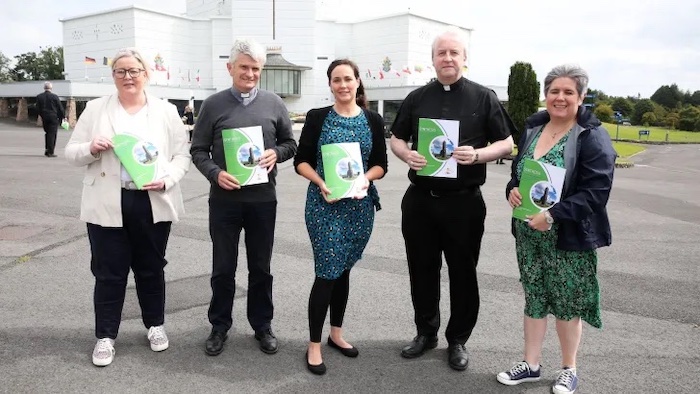
By: Newsy
Father James Martin has taken his message of prayer and inclusivity everywhere, from “The Late Show with Stephen Colbert” to the halls of the Vatican. In May, he wrote to Pope Francis with a few questions.
“I just wanted to give him a time to briefly talk to LGBTQ Catholics,” Martin said.
Francis has extended apologies to the abused and a welcome to the historically rejected. According to the Vatican News, he recently met with transgender people near Rome, Italy.
So Martin’s questions aren’t so random.
“I asked him, ‘What would you most like them to know about the church?'” Martin said. “He said, ‘Read Acts of the Apostles,’ which was really interesting because there’s a church that’s kind of mixing it up. Then also, ‘What would you say to an LGBTQ Catholic who felt rejected by the church?’ And he said very interestingly to remember that it’s not the church that rejects you, the church loves you, but it might be individual people in the church.”
It isn’t the first time Francis has corresponded directly with Martin on LGBTQ relations or the first time he has spoken up about their place within the Catholic church.
In 2016, Francis agreed the church should apologize to not only gay people but other marginalized groups, like the poor. He’s also called for parents to accept their LGBTQ children.
Francis’ gestures are one thing; changing church doctrine, which teaches that the act of homosexuality is sinful, is another.
“What would have happened really, in a sense, is for theologians working together, along with church officials, to come to some newer understanding of how they can accommodate for older church teaching on these issues, to show that the church evolves rather than dramatically changing,” said Michele Dillon, professor of sociology at the University of New Hampshire. “Because the church is not going to say, ‘Oh, we were wrong.’ It’s very rare.”
“If he were to do that, which I don’t think Pope Francis will, but if he were to do that, he would not want to do it without support from the Curia and the College of Cardinals,” said Cristina Traina, professor of Catholic theology at Fordham University. “He would not want to do it without tracing a pathway theologically.”
Instead, Francis has gone another direction: one met with both criticism and praise, uplifting LGBTQ Catholics while simultaneously reiterating church doctrine.
NEWSY’S AMBER STRONG: Is he sort of riding the line between saying that this is doctrine and doctrines not going to change? But, we also still need to love and affirm people as well.
FATHER JAMES MARTIN: I think that’s a good question, and I think he is kind of trying to straddle that line. But I think one thing to remember is that what seems very bland and tepid in the United States — overseas is a big deal. In the U.S., we might say, ‘Oh, big deal. Of course, you should welcome your kids.’ If you’re in Eastern Europe or sub-Saharan Africa or Latin America or India, that’s a big deal. So, we have to remember that he’s speaking to the whole church.”
According to Pew Research, 76% of U.S. Catholics say society should be accepting of homosexuality. That’s below the rate of Catholic support in countries like Spain and the Netherlands but far higher than places like Lebanon and Nigeria.
Some theologians argue that Francis’ support could have a trickle-down impact on individual Catholics and parishes.
“These things can do a lot to encourage Catholics to embrace LGBTQ people with love and compassion and mercy and not to see them as the Antichrist, the anathema, the enemy of salvation,” Traina said.
In 2021, a group of Catholic leaders, including a cardinal and archbishop, signed a statement calling for widespread support of at-risk LGBTQ youth. According to an NCR analysis of recent listening sessions among U.S. Catholics, there was a growing call for LGBTQ inclusion and more opportunities for women.
“To me, there’s no such thing as an empty gesture because, yes, many times people want to see more clear-cut evidence of change and of their acceptance within the church, but sometimes it’s in small steps,” Dillon said.
In 2021, Martin, a Vatican appointee under Francis, launched Outreach: a website that provides resources to LGBTQ Catholics and leaders. It’s an effort Pope Francis has encouraged.
“He hasn’t changed any church teaching,” Martin said. “I’m not advocating for any church teaching, but he’s advocated a more pastoral response, listening to them, welcoming them, treating them with respect.
Complete Article ↪HERE↩!






